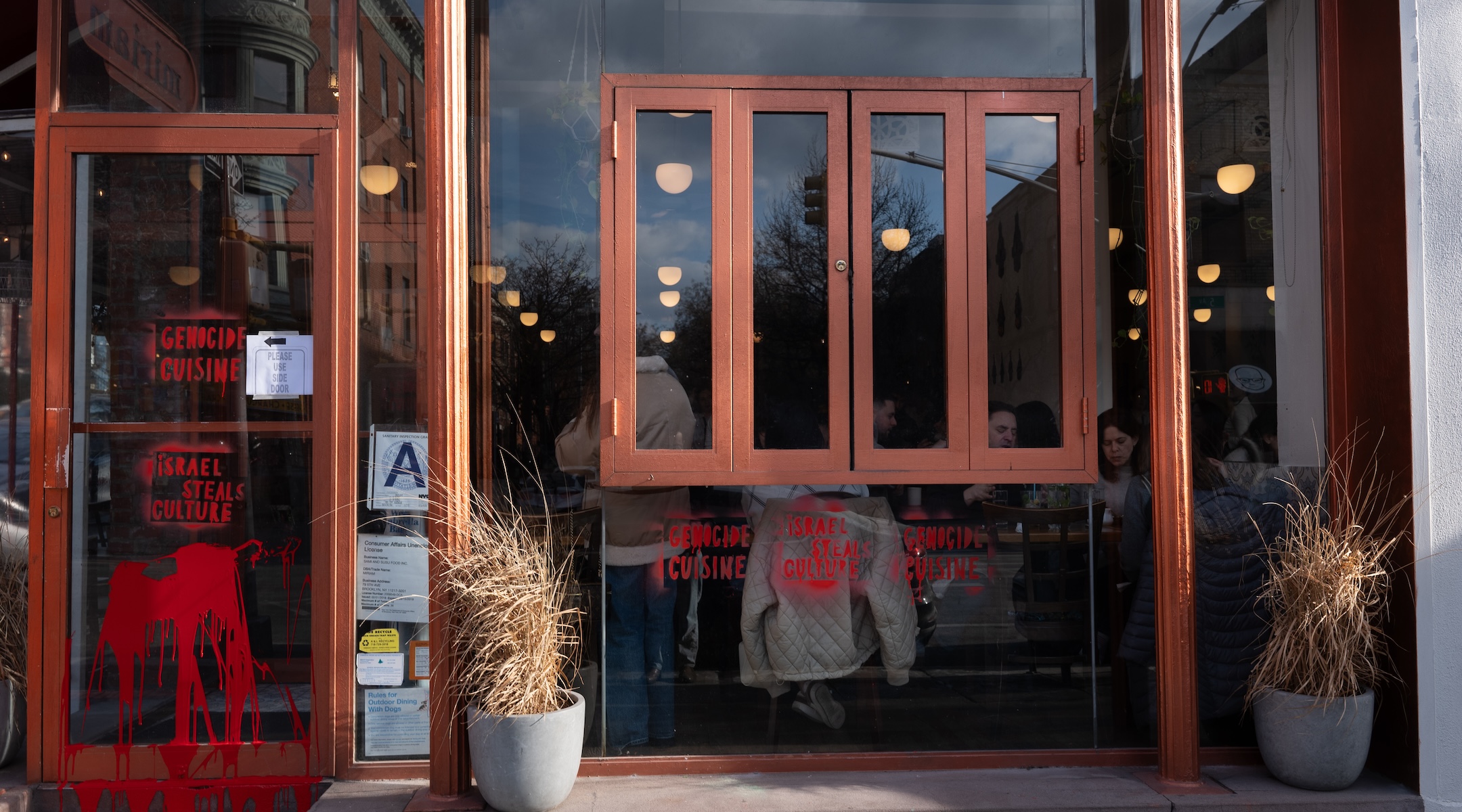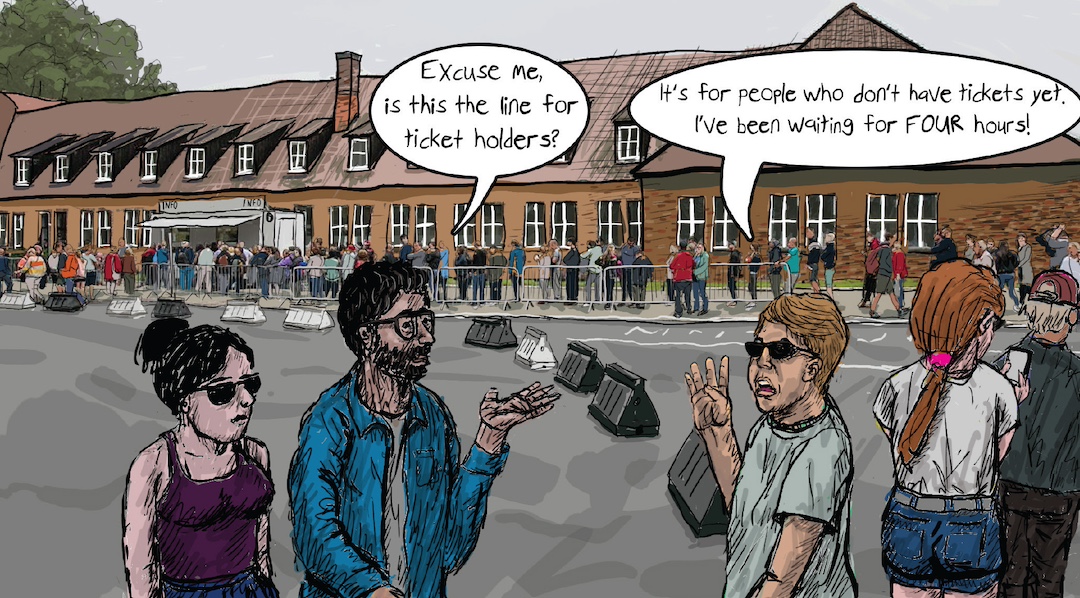Liza Kramer is a regular at the Marlene Meyerson JCC’s weekly havdalah services, held at the Manhattan community center in honor of the hostages in Hamas captivity. Typically she dances along to the Hebrew music toward the back of the room.
But on Saturday night — on the eve of a ceasefire and the return of three hostages held in Gaza — she felt the mood of the moment called for a different energy. So instead, Kramer, who lives in Washington Heights, decided to stay in place and sing from her seat.
The service was a “way for me to start feeling joy again, and bringing my vision of a future where there is peace in the world,” she said, “especially when I saw the fire [of the havdalah candle] burning, and I felt all of us connecting in song.”
Jewish New Yorkers have been gathering at the Upper West Side institution almost every Saturday night for Havdalah for the Hostages since Oct. 28, 2023, just weeks after Hamas’ attack on Israel on Oct. 7, which sparked the war. (The JCC also served as an impromptu gathering place for Jewish New Yorkers to share news, resources and emotions on the day of the massacre.)
Led by Rabbi Joanna Samuels, CEO of the MMJCC, with Ben Romano and Cantor Shimon Smith on guitar, more than 150 people typically meet in the JCC lobby on Saturday evenings to sing songs from the Jewish liturgical canon as well as contemporary tunes about hope and remembrance.
On any given Saturday, attendees gather to join their voices, say prayers, light a candle and smell the sweet potpourri that signals the beginning of a new week, all while keeping in mind those who are still held captive in Gaza. But this weekend’s convening felt different, because the havdalah service also served symbolically as the beginning of what attendees hope will be the conclusion of 15 months of deadly war.
“For me, this ceremony — with all of our traditional blessings and everything — I was, along with the other people who have been praying for peace, creating a separation from the time of war,” Kramer, the former assistant director of the New York Region of the American Jewish Committee, said of the havdalah services.
Saturday was also the second birthday of Kfir Bibas, the red-headed baby and youngest hostage held captive in Gaza, who was abducted when he was just 9 months old. His parents, Shiri and Yarden, and older brother Ariel, are also still captive in Gaza. A large poster of Kfir, updated with his new age, was passed from hand to hand. It traveled from the back of the room — where parents, babies and toddlers sat on the floor — to the front, where Samuels, Romano and Smith sat on stools and sang together, leading the service.
Samuels, speaking to the crowd, pointed to the symbolism of that Shabbat’s Torah portion — called “Shemot,” meaning “names.”
“These names that we have learned, and these faces that we have learned over these interminable 15 months, these names and what we know about our story of redemption is that it didn’t happen all at once — [it took] many stages,” Samuels said. “It took time, it took effort, it took great disappointment, and then being able, in the face of that disappointment, to keep moving forward. That is our yerusha [inheritance]. That is what we have inherited, is to face the moment of redemption and walk through it as long as it takes.”
Michal Zussman, an Israeli and longtime New York resident who volunteers with the Hostages and Missing Families Forum, addressed the room briefly.
“Tonight, we gather here with a mix of anticipation and anxiety, eagerly awaiting the beginning of the return of the hostages,” Zussman, a professor at Columbia University, said. “Half of our forum is currently in Washington, D.C. with an urgent plea and a significant demand of President Trump to ensure that the deal continues through all its stages until all 98 hostages are reunited with their families.”
As part of the deal, the Israeli military is beginning its withdrawal from Gaza as about 33 hostages held by Hamas will be released over the next six weeks. In exchange, Israel will release hundreds of Palestinian prisoners who have been convicted of security offenses. The remaining surviving hostages will be released during the second phase of the deal, which has yet to be negotiated. The deceased hostages would be released in the deal’s final stage.
“There’s a lot of cautious optimism,” Kramer said. “I feel like us invoking our spirituality, our connection to each other, and doing it through song and ritual is what really made for our participation, because we’re in a very, very fortunate place. And our brothers and sisters in Eretz Israel, in Israel and in Palestine, they don’t have that luxury. So we need to do it from here.”
As of Sunday morning, after the JCC event, the ceasefire began, and three women whom Hamas has held hostage in Gaza for more than 470 days have returned to Israel: British-Israeli citizen Emily Damari, 27; Romi Gonen, 24, who was taken from the Nova music festival, and Doron Steinbrecher, who was kidnapped from her home at Kibbutz Kfar Aza.
Ahead of this momentous event, Stacy, who declined to give her last name, was nervous.
“It’s scary because we’re hoping when they come back, they come back alive,” Stacy said. “So hopefully they’ll come back. You know, they’re not going to be the same. It’s not going to be the same, you know what I mean? It’s going to be very hard.”
For Ellen and David Chaikoff, a couple that has regularly attended the service, Havdalah for the Hostages has been a supportive environment.
“We’ve been coming for months to this,” Ellen Chaikoff said. “Every time they had it, we tried to get here. It’s nice to be together, and the singing just feels like we’re all together, and that we can make a difference.”
“We’ve been waiting for a breakthrough, and hopefully this is the beginning of a complete breakthrough and freedom for everyone to come home safely back to their families,” David added. “I just hope this is going to be the beginning of the complete end to this crisis.”
Jewish stories matter, and so does your support.









 English (US) ·
English (US) ·